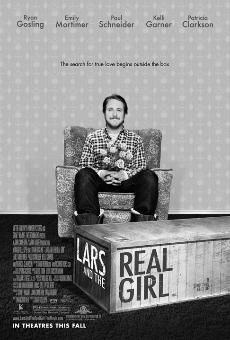Lars Lindstrom has troubles.
He suffers from social anxiety disorder. He’s plagued by painful childhood memories. He feels a cold burn when others touch him. And his girlfriend is a mail-order sex doll named Bianca.
In “Lars and the Real Girl,” Lars (Ryan Gosling) has been pushed by his loneliness into a vivid delusion in which he is in a serious romantic relationship with Bianca, who he believes is a paralyzed Brazilian missionary he met on the Internet. Needless to say, this comes as something of a shock to Lars’ brother (Paul Schneider) and sister-in-law (Emily Mortimer) and to the small Midwestern community he lives in. But when the local doctor (Patricia Clarkson) says the best thing to do is play along with Lars’ delusion, they all do their best to support them and come to terms with their insecurities in the process.
Future filmmakers take note: this is not a good idea for a movie. A mentally ill person’s sex-doll girlfriend is a premise that lends itself to neither comedy nor drama. It’s easy to imagine such a story being the plot of the worst Farrelly brothers movie ever, or as a “Little Miss Sunshine” clone gone horribly awry (as it is currently being marketed).
And yet, “Lars and the Real Girl” almost works. Director Craig Gillespie keeps the mood carefully reined in and lets the fine actors and actresses in his film turn this ugly duckling of a plot into a pretty good-looking duck of a movie.
Gillespie avoids the bombastic quirkiness that we’ve come to expect from Hollywood indies (i.e. “Napoleon Dynamite” or anything Wes Anderson-related) and instead turns in a quiet and unglamorous movie. He taps into the cold isolation of Northern rural life so well we can almost believe its residents might go to such extremes.
Gosling gives a strong and convincing performance as the mixed-up Lars, Mortimer plays a sweet mother figure with a lot of warmth, and Schneider quietly steals the show as Lars’ much put-upon brother. They act with real sympathy for their characters, no matter how comedic the circumstances.
Even these performances can’t gloss over many of the suspensions of disbelief the movie demands of its audience. The doctor’s advice (let’s look past how the Lindstrom family doctor is conveniently also a psychiatrist for a moment) to have the whole town play along with Lars’ delusion seems a little suspect.
The town’s quick acceptance of Bianca and Lars’ madness also strikes me as a little unlikely. Indeed, the last act of the film is pretty much one unlikely plot point after another, climaxing in a somewhat confused ending.
But despite its flaws, there’s something lovable about “Lars and the Real Girl.” It’s a film with a modest scope, and it manages to be funny without getting too condescending and serious without getting too preachy. It shows regular people taking care of each other no matter how crazy things might get, which is always a nice thought.
Kevin Corcoran can be reached at
kpcorcor@loyno.edu.






